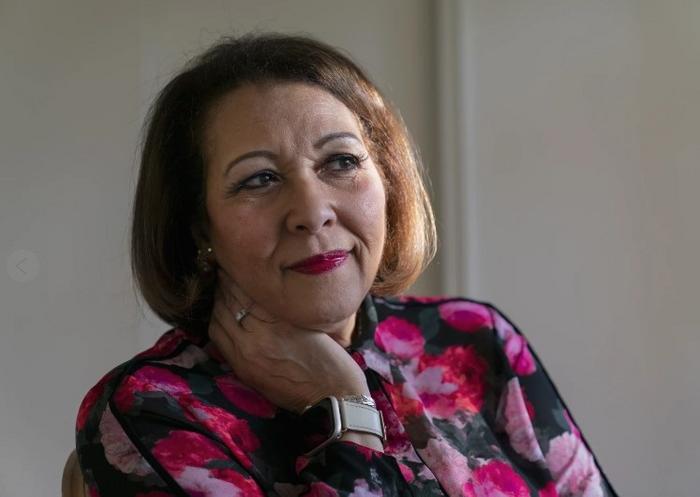A clinical trial led by the ECOG-ACRIN Cancer Research Group (ECOG-ACRIN) demonstrates how diversity among study participants is vital for reducing outcomes disparities. Among the vast group of women participating in the TMIST breast cancer screening trial–nearly 93,000 so far–21% self-identify as Black or African American. This diversity offers hope that once the trial reaches its enrollment goal of nearly 129,000 women, its results can better inform and tailor future breast cancer screening for all women.

Credit: AP Photo/Stephanie Scarbrough
A clinical trial led by the ECOG-ACRIN Cancer Research Group (ECOG-ACRIN) demonstrates how diversity among study participants is vital for reducing outcomes disparities. Among the vast group of women participating in the TMIST breast cancer screening trial–nearly 93,000 so far–21% self-identify as Black or African American. This diversity offers hope that once the trial reaches its enrollment goal of nearly 129,000 women, its results can better inform and tailor future breast cancer screening for all women.
The TMIST breast cancer study is investigating whether screening for breast cancer with digital breast tomosynthesis, also called 3-D mammography, can more reliably diagnose breast cancer than a 2-D technique that has been in use longer. Comparing 2-D with 3-D imaging may illuminate new possibilities for how breast cancer screening can be more individually tailored.
ECOG-ACRIN is an international research leader in precision, or personalized, medicine. This study also aims to reach into the future, as one of its components is the creation of an extensive collection of biological data, images, and specimens from study participants. This resource will be used to develop personalized screening strategies following the completion of the trial.
The more participants that take part in the TMIST trial, the more inclusive the science will be. Thus, a more holistic medical understanding can be used for the benefit of future generations.
As Carole Stovall, a TMIST study participant, recently told Carla Johnson of the Associated Press, “We all need a mammogram anyway, so why not do it with a study that allows the scientists to understand more and move closer to finding better treatments and ways of maybe even preventing it?”
Stovall speaks to the importance of conducting research like TMIST, as well as receiving regular mammograms. Serendipity brought her into the trial, which she learned about while at a hair appointment in Washington, DC. Health disparities researcher Dr. Lucile Adams-Campbell, a professor of oncology at Georgetown University, was at the same salon. The two struck up a conversation about the need for more Black women—who are 40% more likely to die from breast cancer than white women—to take part in breast cancer studies. Stovall, like so many, was overdue for a mammogram since the COVID-19 pandemic prohibited easy access to screenings.
Cancer treatment studies average about 9% representation for Black women. Across TMIST’s U.S. study sites, the participation among Black women is more than double the typical rate. As recruitment continues, enrolling Black women and other women of color will continue as a priority.
Ricki Fairley, a breast cancer survivor and co-founder of Touch, The Black Breast Cancer Alliance, underscores to the Associated Press how essential it is to have increased representation among research volunteers. “Until we get more Black women into clinical trials, we can’t change the science. And we need better science for Black bodies,” she says.
Many volunteers are contributing blood and cheek swab samples to the biorepository that can unearth insights for future generations of research. With Stovall as an example, participants in TMIST are not only getting screening for themselves, but they are also contributing to a study that offers better hope for their daughters, granddaughters, and beyond.
Women ages 45 to 74 without a personal history of breast cancer are eligible for the study, which is now running at sites in 32 U.S. states. In addition, the trial is available at sites in Argentina, Canada, Italy, Peru, and South Korea. Now, a site in Thailand is open.
“We added more international sites to enhance the trial’s diversity, particularly for Hispanic and Asian women,” Dr. Etta Pisano, who leads the study, tells the Associated Press.
About TMIST
The Tomosynthesis Mammographic Imaging Screening Trial (TMIST) is the first randomized trial that seeks to identify women for whom digital breast tomosynthesis, also called 3-D mammography, may outperform digital (2-D) mammography in reducing advanced cancers–those more likely to kill women. Although tomosynthesis is the newer technology, and more sensitive, investigators want to confirm if this sensitivity actually benefits women and improves their probability of living lnoger. To help researchers discover ways to tailor future screening to a woman’s individual risk, the study is creating a large curated dataset of clinical data, images, and biospecimens from study participants. The ECOG-ACRIN Cancer Research Group is conducting TMIST with funding from the National Cancer Institute (NCI) through its NCI Community Oncology Research Program (NCORP) and National Clinical Trials Network (NCTN). The NCI is part of the National Institutes of Health. Learn more at https//ecog-acrin.org/tmist.
About ECOG-ACRIN
The ECOG-ACRIN Cancer Research Group (ECOG-ACRIN) is a membership-based scientific organization that designs and conducts cancer research involving adults who have or are at risk of developing cancer. The Group comprises nearly 1,300 member institutions and 15,000 research professionals in the United States and around the world. Visit ecog-acrin.org, follow us on X (formerly Twitter) @eaonc, Facebook, and LinkedIn, or call 215.789.3631.
Method of Research
Observational study
Subject of Research
People



